Excellence in Education: Training for Liberty
Lee K. Anthony
I. Intro and Background
Annyong Ha Seyo!
I thank Dr. Kim, the
ICAS Board, and thanks to Mr. Il
Hwan Kim for inviting me to speak today at the
ICAS
Summer Symposium. And thank you to the wonderful people who are under the
leadership of Pastor Sung Kee Ho at Antioch Church in Conshohocken for allowing our
Academy to operate alongside inspirational Christians ... our family tries to worship
several times during the year at 5 AM, and it is definitely an memorable experience to
wake up at four AM, get my 16 yr old son and husband up and moving, and join the
hundreds of Korean Americans praying at Antioch, who then go out to run successful
businesses and take care of their families. I feel better about the future of America when
I am with my Korean friends!
Our family has lived in Lower Merion Township for almost 25 yrs. As background, our
school, The American Academy, was founded in 1994 after we discovered that the Lower
Merion schools were not providing a rigorous academic education for our children. The
students did not learn phonics or serious math. The emphasis in elementary school was
not on academics, but on student self esteem, and a host of non academic psychological
exercises to shape the students attitudes, including drug education, sex education,
environmental education, death education, conflict resolution, whole language, outcomes
based education, and on and on. Memorizing was out. Arithmetic times tables were out.
Grammar was out. Good Literature and real science: OUT.
Expressing your feelings without restrictions was "in"... I liked the teachers as
people, but I could not allow my children to stagnate in that system. I wanted them to
have discipline, good role models, an obedient sprit, love reading and be ready to learn.
After several years of attending school board meetings, writing letters to the editor and
being publicly mocked in school board meetings for suggesting a return to the classics
and rigorous math, my husband and I gave up on public education.
As I looked to the many famous private schools on the Main Line, I was dismayed to find
that they, too, used similar textbooks and teaching techniques. With no satisfactory
alternatives existing, what else could we do - we started a school.
As I started reading more commentary on the subject of education, I found that my
experience at Gladwyne Elementary School was common throughout the United States.
The troubles that plague K-12 education are carried into the college level. Because I also
am the guidance counselor at The American Academy, I am all too familiar with what is
happening on college campuses, and it is not good.
SO, there is
bad news about the state of education, and there is
good news.
I will start with the bad news so that we can hear good news before we go to
lunch!
II. Public
Education fails. My aim today is to discuss education as a
national issue and also on a personal level to encourage each of you to single mindedly
pursue educational excellence as a priority for your children; if I or The American
Academy can help you in that process we would be happy to, even if you do not attend
our school. You already have taken an important step, by participating in
ICAS!
The US Constitution did not provide for Public Education as a right. Public schools
didn't really come into being until after the Civil War, and the US Dept of Education
wasn't created until the 1960s.
Let's take a look at the "Big Picture". I like quotes, so here is a provocative
one from the
US Department of Education, in their 1983 landmark report, A
Nation at Risk:
If an unfriendly foreign power had attempted to impose on America the mediocre
educational performance that exists today, we might well have viewed it as an act of war.
As it stands, we have allowed this to happen to ourselves...We have, in effect, been
committing an act of unthinking, unilateral educational disarmament.
Let's look at what some of the scholars of the revolutionary and post revolutionary period
had to say, since our focus today is training for liberty, the Founders will be our
"primary sources." At TAA we always train our students to use primary
sources...
Frenchman Alexis de Tocqueville wrote his famous book,
Democracy in America
about his observations of the new and vigorous American spirit, and he influenced
Orestes Brownson to write a work called "
In Opposition to
Centralization" in 1839 which clearly outlines that centralized education such as
in Prussia was the
last thing that Americans wanted:
"A government system of education in Prussia is not inconsistent with the theory of
Prussian society, for there all wisdom is supposed to be lodged in the government. But
the thing is wholly inadmissible here . . . because, according to our theory,
the people are
supposed to be wiser than the government. Here, the people do not look to the
government for light, for instruction, but the government looks to the people. The people
give the law to the government. To entrust, then, the government with the power of
determining the education which our children shall receive is entrusting our servant with
the power to be our master. This fundamental difference between the two countries
, we apprehend, has been overlooked by the board of
education and its supporters."
The Founder's would turn in their graves to know that we now have a completely
centralized, Government controlled system of education which captures a whopping
86% of our nation's youth. The teachers are also centralized in two trade unions;
the NEA is the largest labor union in the world, and it has a radical agenda. The
Government system is so large and its union so powerful that it has unprecedented
influence on text book publishing, College Board standardized testing, teacher
credentialing and almost every aspect of our educational system. Parents are
disenfranchised by this monolithic system where academics and student achievement are
not primary goals.
My disclaime: Before I give you statistics about the failure of Public Education I
want to say that my comments are not directed toward individual teachers. I know many
individual teachers in public schools who are excellent. My criticism is about the
system of a highly centralized monopoly of education, where there is inefficient use
of resources and no parental control. I do not wish to offend anyone here; I wish to open
a debate and share ideas and hopefully through this process come to constructive
conclusions about the education which is so important to our children's future as well as
to the future of our country.
As an MBA, I like to see results, so let's see how American students compare
internationally.
SLIDE WITH SCIENCE TEST SCORES. Americans spend more
money and have fancier facilities than their global counterparts, but we fail miserably in
international test scores. Our top students in 12th grade cannot compete with the
top students internationally. Because we have limited time, I am going to quickly run
through a sampling of the irresponsible performance that characterizes American schools
all across the country.
Math and science offer the only common basis for comparing American schools to the
rest of the world. Other subjects vary from one country to another. Results of the
Third International Mathematics and Science Study (TIMSS, 1999 and 2003)
involving a half-million students in 41 countries are authoritative. Oversight groups
included not only the world's leading experts on comparative studies of education
systems, but also experts in assessment design and statistical analysis.
By grade 4, American students only score in the middle of 26 countries reported. By
grade 8 they are in the bottom third, and in grade 12 the US ranks near the bottom. It's
even worse when you notice that some of the higher ranking countries in grade 8
(especially the Asian countries) were not included in published 12th grade results,
because they do not need 12 grades
SAT scores reached their apex in the 1960's. After that, SAT mean scores started
to decline (remember that we started to centralize education in the newly created US
Dept of Education at that time) until 1994 when the decline was so embarrassing that we
"re-normed" the SAT scores nationally by adding points to the verbal and math
mean.
SLIDE WITH SCIENCE DEGREE comps
There are some very disturbing trends in the United Sates with respect to our global share
of science, technology, engineering and mathematics expertise, direct results of our
poor performance in K-12 math and science. In 2004 the National Science
Foundation published data demonstrating that our country is producing far fewer
engineers than are other parts of the world, particularly Asia. R.E. Smally, a Nobel Prize
winning scientist from Rice University, has predicted that before 2020, 90% of all PhD
physical scientist and engineers in the world will be Asian living in Asia.
Why is this important? As professor Herbold explains, from the President's
Council of Advisors on Science and Technology, these science fields are vitally
important to the business world in the USA. Over 50% of the CEOs of our
Fortune 100 companies come from a technical background. PhD expertise in these
fields drives the kind of highly prized innovations that lead to the emergence of new
industries We risk seeing our industrial leadership weaken.
: K-12 Establishment is Putting America's Industrial Leadership at
Risk
Robert J. Herbold, as printed in Imprimis, February 2004
Figure 2: Engineering & Science Degrees as a % of all Bachelor Degrees
Singapore
68%
U.K.
28%
Germany
31%
S. Korea
36%
USA
17%
Sweden
24%
China
58%
Taiwan
34%
Belgium
22%
Figure 3: Number of PhD degrees in Engineering and Science
1987 2001
USA 4,700 4,400
All Asian countries 5,600 24,000 *
*(25 percent fewer Asians got such degrees at U.S. universities in 2001 than in 1996)
( SLIDE WITH NO CHILD LEFT BEHIND DATA)
OK let's talk about economic inefficiency and lack of accountability inherent in our
huge Government education monopoly. For our example, I have chosen to look at a highly publicized 2001 congressional program in education called
"NO CHILD LEFT BEHIND."
No Child Left Behind, or is it Many Children Left
Behind?
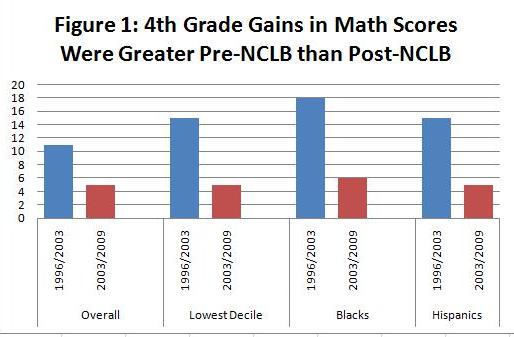
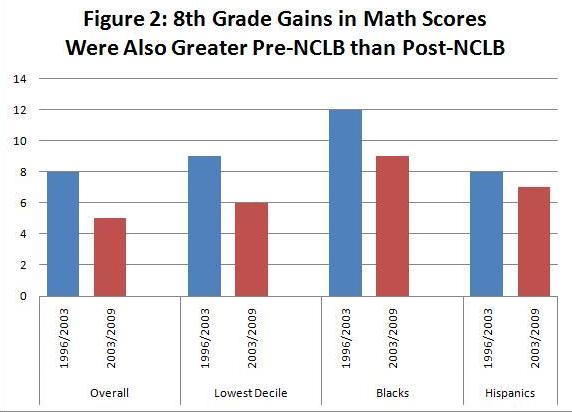
From the National Center for Education Statistics ("The Nation's Report Card")
NCLB=No Child Left Behind Act of 2001 Figure 1 shows the pattern for fourth
grade students, graphing the size of the gains overall and for each of the student groups
that NCLB was specifically designed to help: low-performing students, black students,
and Hispanic students.
In each case, we see that the pre-NCLB gains were greater than the post-
NCLB gains, sometimes substantially. For example, among the lowest-performing
students in the nation (those scoring in the bottom 10 percent), scores between 1996 and
2003 increased by 15 points. In the NCLB years, they increased by only 5 points. Gains
among Hispanic and black students were also far lower during the post-NCLB
period.
Many experts offer their own reasons for the failure of NCLB act-Unfortunately, we
have too many possible explanations for far too little data-but the bottom line is
clear: NCLB has not worked the way it was intended and the nation is worse off
because of it. (From an essay by Mark Schneider, American Enterprise Institute
Journal, 10/14/09.)
_
SLIDE on Civic Literacy
So, we can't do Math or Science, but how about Civics and preparing our students
for engagement in the Political Process. After all, if the US Constitution
requires "We the People" to self govern in order to preserve liberty,
then Civic Literacy should be a priority for our students, shouldn't it? Well, let's
look at the "bottom line" in an annual survey administered to 14,000 students
by the Intercollegiate Studies Institute. As you can see, the students at Johns Hopkins,
Yale and Princeton not only flunk this test of basic knowledge, but they know less about
civics when they graduate!!
If you wish to take the test yourself, you can at www.isi.org. At The American Academy, we expect
our 5th graders to score 80% or greater. I will also note that the incoming freshman scores really are not
a reflection on the colleges. This is a reflection of what students are learning, or I should say what
students are NOT learning in the K-12 public school system.
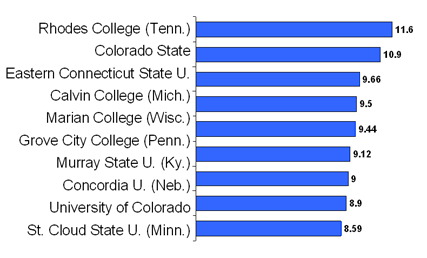
Source: Intercollegiate Studies Institute
And here are the bottom 10 schools -- which saw their students lose the most ground (the figures show
the percentage point decrease in scores between freshmen and seniors):
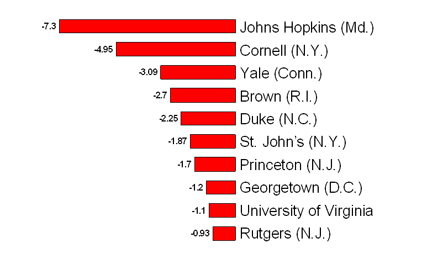
Source: Intercollegiate Studies Institute
SLIDE: READING in the USA
Reading is the single most important element in a student's education. Evidence
suggests, however, that US students fail miserably in their reading ability and even
worse, they do not care that they are ignorant and don't read. A powerful book
on this subject, THE DUMBEST GENERATION by James Madison Fellow Mark
Bauerlein, sounds the alarm and makes a case for "digital detox," or
limiting computer, TV, texting, and internet usage and returning to reading
books.
Not only does this mean that US students are not reading and doing homework, or doing
something productive like practicing a musical instrument, etc, but they are becoming
isolated from normal family interactions such as eating dinner together or playing
with siblings or neighborhood friends. This isolationist existence of the typical student is
destructive to their social development, their academic progress, and to developing strong
communities. I don't know about you, but to me the most distressing thing about the
internet is that parents have no idea who their child is talking to, or for how long, or what
they are saying. It's all secret. Parents are forbidden to enter their child's virtual society.
As Bauerlein demonstrates in his book, 2/3 of students are not proficient in reading and
therefore only 45% vote, because they cannot comprehend a ballot. On average, they
watch TV and play video games 2-4 hours per day. They have more schooling and less
knowledge than ever before. In a gloomy conclusion, Bauerlein states, "They
may even be the generation that lost that great American heritage,
forever."
SLIDE ON RAINFOREST ALGEBRA
So with all the academic gloom and doom that I have outlined, what are the public
schools doing about it? Well, just about nothing. If you really want to be
depressed, read the resolutions from the National Teacher's union convention. You will
be hard pressed to find any mention of striving for academic excellence. As a matter of
fact, academic excellence isn't politically correct, since it means some students will excel
over others, and this is not encouraged. Even math and science are not exempt from this
"everyone gets the right answer no matter what" approach. You can amuse
yourself for hours perusing this non academic math curriculum which is responsible for
our miserable test scores at "Weapons of Math Destruction," one of
my favorite websites.
SLIDE ON RED PENCIL
In elementary school reading isn't the teachers' priority, but creating
self esteem in each student is. Everyone is an honors student, and no one
should ever feel bad about their poor work. Pedagogy now dictates that
teachers are not permitted to use red pencil to correct student papers, because
it would be confrontational to the student, and red signifies blood and
violence. In Lower Merion schools I am told that Green is the color of choice when
correcting papers, because it signifies "GO."
(NO SLIDE) There are also TEACHER COMPETENCY problems- Teacher
certification bears no relation to their scholarship. Teachers tend to have low SATs, and
a large percentage of public school teachers do not have a major or minor degree in the
subject they teach. In Philadelphia, 1/2 of the public school teachers failed a competency
test and none were fired due to strict tenure agreements. The teacher's union consistently
opposes any teacher competency tests for credentialed teachers. Where else is your job
guaranteed regardless of your performance?
SLIDE: Public Education F
To summarize our points thus far, Government education has received an F in math,
science, reading, civics, teacher competency, and economic efficiency, accountability,
transparency...so what is the GOOD NEWS
I. Here is the GOOD NEWS : with liberty we have private innovative and
competing ideas about education, and we know from history the kind of education which
produced our Founding Fathers. We can do it, too. But let's back up. (SLIDE)
Let's define the Proper Purpose of Education - TO TEACH WISDOM AND
VIRTUE. The purpose of education is more than to simply get a job, although that
is important. The ingredients of an excellent education: good teachers, and
the right curriculum. Wisdom and Virtue equal academic instruction and moral
instruction. Both elements are essential, indeed if you had to choose one over the other,
it would have to be moral instruction since otherwise we are producing very clever
criminals.
In the ideal world, academic and moral instruction comes from the parents, the church,
and the school, all teaching within a similar worldview. Home, church and school - the
three legged stool...a solid foundation and broad network of good role models and
mentors.
The Founders knew that self governance and liberty depended on the education of the
people. This education was of the upmost importance to allowing liberty and a civilized
society. As Benjamin Franklin acknowledged after he finished his work at the
Constitutional Convention, "It's a republic, if we can keep it." Let's talk
about how we can train up our children to "Keep it" strong for the next
generation of Americans.
Those words, WE THE PEOPLE which start the preamble to the US Constitution,
embody the new and daring idea which these brilliant men had, to SELF
GOVERN. They spurned royalty and did NOT want a reinvented version of the
monarchy they had fled from in Britain. Training for Liberty, we cannot find better role
models for education than the men who invented Liberty, our Founders, who
had the Epic task of building our nation. As soon as the American Revolution was
won by the Americans, the Founders started to worry about how to preserve
their new republican government. In a 2001 address to the American Association of
Law Schools, scholar Davison Douglas summarized,
"Many eighteenth-century Americans viewed education as perhaps the most vital
component in the preservation of a republican form of government's.36 While monarchy
used education, or the lack of it, to fix each social class in its proper place in the political
order, republicanism demanded an educated citizenry equipped to engage in the processes
of self-government.37 Indeed, an educated public could operate as yet another of the
checks and balances found in republican constitutions.38 As Jefferson said,
"Enlighten the people generally, and tyranny and oppressions of body and mind will
vanish like evil spirits at the dawn of day."39 On another occasion he exclaimed:
"Where the press is free, and every man able to read, all is safe."40
Jefferson believed that a republican form of government could not survive without public
virtue, and that such virtue could not simply be assumed.43Young men, especially those
who would provide leadership, must be trained to exercise public virtue, particularly in
the face of the strong inducements of a purely private life.44
Historian George Nash points out that the Bible was cited more frequently than
any other source in the Revolutionary War era. Do you think our public school students
know that?
Today, our government schools do not want us to know that the Founders viewed Liberty
as being wholly dependent on the religious instruction of the people, and this religious
instruction had to be Christian to permit maximum religious freedom (where else in the
world is there real religious freedom?)
SLIDES ON FOUNDERS QUOTES ON RELIGION, EDUCATION
and Liberty (Washington, Adams, Acton)
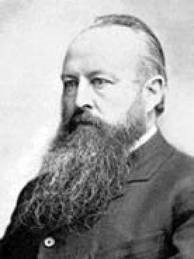
Lord Acton, (1834-1902), First Baron Acton of Aldenham defines Liberty:
Liberty is the prevention of control by others. This requires self-control and, therefore,
religious and spiritual influences; education, knowledge, well-being.
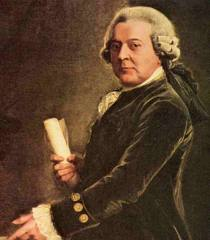 John Adams
John Adams
Signer of the Declaration of Independence and Second President of the United States
It is religion and morality alone which can establish the principles upon
which freedom can securely stand. The only foundation of a free constitution
is pure virtue.
(Source: John Adams, The Works of John Adams, Second President of the United States, Charles
Francis Adams, editor (Boston: Little, Brown, 1854), Vol. IX, p. 401, to Zabdiel Adams on June 21,
1776.)
[W]e have no government armed with power capable of contending with
human passions unbridled by morality and religion. . . . Our constitution was
made only for a moral and religious people. It is wholly inadequate to the
government of any other.
(Source: John Adams, The Works of John Adams, Second President of the United States, Charles
Francis Adams, editor (Boston: Little, Brown, and Co. 1854), Vol. IX, p. 229, October 11, 1798.)
The moment the idea is admitted into society, that property is not as sacred
as the laws of God, and that there is not a force of law and public justice to
protect it, anarchy and tyranny commence. If "Thou shalt not
covet," and "Thou shalt not steal," were not commandments
of Heaven, they must be made inviolable precepts in every society, before it
can be civilized or made free.
(Source: John Adams, The Works of John Adams, Second President of the United States, Charles
Francis Adams, editor (Boston: Charles C. Little and James Brown, 1851), Vol. VI, p. 9.)

George Washington
"Father of Our Country"
While just government protects all in their religious rights, true religion
affords to government its surest support.
(Source: George Washington, The Writings of George Washington, John C. Fitzpatrick, editor
(Washington, D.C.: U.S. Government Printing Office, 1932), Vol. XXX, p. 432 n., from his address to
the Synod of the Dutch Reformed Church in North America, October 9, 1789.)
Of all the dispositions and habits which lead to political prosperity, religion
and morality are indispensable supports. In vain would that man claim the
tribute of patriotism who should labor to subvert these great pillars of human
happiness, these firmest props of the duties of man and citizens. The mere
politician, equally with the pious man, ought to respect and to cherish them.
A volume could not trace all their connexions with private and public
felicity. Let it simply be asked, Where is the security for property, for
reputation, for life, if the sense of religious obligation desert the oaths, which
are the instruments of investigation in Courts of Justice?
And let us with caution indulge the supposition that morality can be
maintained without religion. Whatever may be conceded to the influence of
refined education on minds of peculiar structure, reason and experience both
forbid us to expect that national morality can prevail in exclusion of
religious principle. It is substantially true, that virtue or morality is a
necessary spring of popular government. The rule, indeed, extends with
more or less force to every species of free government. Who, that is a
sincere friend to it, can look with indifference upon attempts to shake the
foundation of the fabric?
(Source: George Washington, Address of George Washington, President of the United States . . .
Preparatory to His Declination (Baltimore: George and Henry S. Keatinge), pp. 22-23. In his
Farewell Address to the United States in 1796.)
[T]he [federal] government . . . can never be in danger of degenerating into a monarchy, and oligarchy, an aristocracy, or any other despotic or oppressive
form so long as there shall remain any virtue in the body of the
people.
(Source: George Washington, The Writings of George Washington, John C. Fitzpatrick, editor
(Washington: U. S. Government Printing Office, 1939), Vol. XXIX, p. 410. In a letter to Marquis De Lafayette, February 7, 1788.)
SLIDE Liberty and Christianity

Frenchman Alexis de Tocqueville wrote the classic book, Democracy in America,
his observations of what was unique about the new American Government (1835). He
wrote,
The Americans combine the notions of Christianity and of liberty so intimately in their
minds, that it is impossible to make them conceive the one without the other...
READING WAS A WAY OF LIFE in colonial America. Colonial boys read
Greek and Latin early and demonstrated proficiency before they entered college, which
was generally at age 14-15. Several of the founders, including Adams, attended Harvard.
The only academic requirements for admission to Harvard University were as follows:
"When any scholar is able to sight read or similar classical Latin authors
write and speak true Latin in verse and prose , and decline perfectly the paradigms of
nouns and verbs in the Greek tongue, then may he be admitted into the college, nor
shall any claim admission before such qualification."
Typical Library of a Founding Father: A Bibliographical Essay by Forrest
McDonald (Liberty Fund)- it was common for the Founders toread up to 12
hours per day, starting before in the morning and slacking off around 4 PM
suppertime, and changing to "belle letters" genre books in the evening (that's
the "light" reading of fiction, poetry, drama, like Shakespeare!). I have a list
of the books that most of the Founders read, if that is of interest. (read a
sampling)
Because the classical languages, Latin and Greek, the classical writings and culture are so
full of intellectual worth, we emphasize the classics at The American Academy, as well
as the disciplines of Logic and Rhetoric. We do not have to "reinvent the
wheel" for educational excellence, metaphorically speaking, we simply need
torediscover it and use it.
In conclusion, I wanted to read two quotes from Abraham Lincoln, one of our
greatest Presidents. The first is a prophetic warningabout how we as a nation
might fall in the future, which I think applies directly to our failing system of education
and consequent casual attitude of entitlement of our citizens. In 1838, 28 year old
Lincoln gave a speech titled, "The Perpetuation of Our Political
Institutions," in which he stated,

If destruction be our lot, we must ourselves be its author and finisher. As a nation of
freemen, we must live through all time, or die by suicide.
We're not dead yet, but let's say we are in the last stages of "life support."
This is our challenge as parents and as a nation in the education of our children: to work
diligently to teach and guard our liberty, for as Abraham Lincoln so eloquently stated in
his famous Gettysburg Address, November 19, 1863
...that we here highly resolve that these dead shall not have died in vain -- that this
nation, under God, shall have a new birth of freedom -- and that government of the
people, by the people, for the people, shall not perish from the earth.
Thank you for the privilege of addressing you today and I look forward to any questions
you have. I have pencils for you to take. If you wish to learn more about TAA, or to
inquire about admission, please visit our website and contact me to set up an
appointment.
Bibliography of Books Read by Founding Fathers:
Every household owned and read the Bible
Newspapers were widely read - according to the Liberty Fund research, "we may
safely estimate that half the adult male population read the newspaper with some
frequency."
Classical Histories
Virgil, Cicero, and Tacitus in Latin.
Thucydides in Greek.
Charles Rollin, The Ancient History, 2 vols. (London, 1739-1750).
David Langhorne's edition of Plutarch's Lives.
James Hampton's 1762 translation of The General History of Polybius2 vols.
(London, 1762-1763).
Walter Moyle, The Whole Works (1727).
Edward Wortley Montagu, Reflections on the Rise and Fall of Ancient Republics
Adapted to the Present State of Great Britain(1759).
Oliver Goldsmith, The Roman History 2 vols. (1769).
Tacitus's Germania. In 1728 Thomas Gordon published a translation of Tacitus's
works in two volumes.
English History
Paul de Rapin-Thoyras, five-volume History of England(English translation by
Nicholas Tindal, 1732-1747, reissued in part in Boston, 1773).
Nathaniel Bacon, An Historical Discourse of the Uniformity of the Government of
England (2 vols. 1647-1651)
John Jacob Mascou, History of the Ancient Germans (translated by Thomas
Lediard, 1737, with the title The History of Our Great Ancestors).
Henry Care, English Liberties (1680).
Henry Home, Lord Kames, British Antiquities (1763).
Obadiah Hulme, Historical Essay on the English Constitution (1771)
John, Lord Somers, Vox populi, Vox dei: Judgment of Whole Kingdoms and Nations
concenring the Rights, Privileges, and Properties of the People, first published in
1710 but reprinted in cheap editions in Philadelphia in 1773 and Newport in 1774.
Henry St. John, Viscount Bolingbroke, Remarks on the History of England was
published as part of his collected works in 1754.
David Hume, History of England (1754-1762), 6 vols.
Catherine Macaulay, History of England, 8 vols. (1763-1783)
James Burgh, Political Disquisitions (1774).
Sir William Blackstone, Commentaries on the Laws of England. (The Philadelphia
printer Robert Bell published a subscription edition of Blackstone's Commentaries
in 1771-1772).
William Molyneaux, The Cause of Ireland, originally appeared in 1698, three new
editions were published between 1770 and 1776.
Sir William Temple, Observations upon the United Provinces of the Netherlands
(London, 1673).
Science
Sir Isaac Newton's Philosophiae natuiralis Principia Mathematica (London, 1687).
Oliver Goldsmith, History of the Earth and Animated Nature.
W.B. Martin, Philosophica Britannica, or a New and Comprehensive System of the
Newtonian Philosophy (1747).
George-Louis Leclerc Buffon, Natural History (1749-1783)
International Law
Hugo Grotius, The Rights of War and Peace(Paris, 1625), the first English edition
appeared in 1654. The best edition, in Hamilton's view, was that of 1738 (reissued 1749)
with notes by Barbeyrac.
Samuel F. Pufendorf, The Law of Nature and Nationsappeared first in Latin and was
published in English in 1703 (the 1712 edition had notes by Barbeyrac).
Jean Jacques Burlamaqui, The Principles of Natural and Political Law (2 volumes
1747, first English edition 1748, 1752).
Emmerich Vattel,Law of Nations (1758, English edition 1759).
Political Theory
Plato, The Republic.
John Locke, Second Treatise on Civil Government (1690).
James Harrington, Oceana (London, 1656).
Algernon Sidney, Discourses Concerning Government (London, 1698).
Henry Neville, Plato Redivivus; or a Dialogue concerning Government (London,
1681).
Nathaniel Bacon, Historical and Political Discourses.
Marchament Hedham, Excellencie of a Free State.
Sir Robert Melesworth.
John Milton.
Charles Davenant, Political and Commercial Works.
John Trenchard and Thomas Gordon, Cato's Letters (London, 1724).
Henry St. John Viscount Bolingbroke.
James Burgh, Political Disquisitions(London, 1774-75).
Montesquieu, The Spirit of Laws(Paris, 1748).
Lord Acton.
This page last modified April 16, 2011 jdb





 John Adams
John Adams

